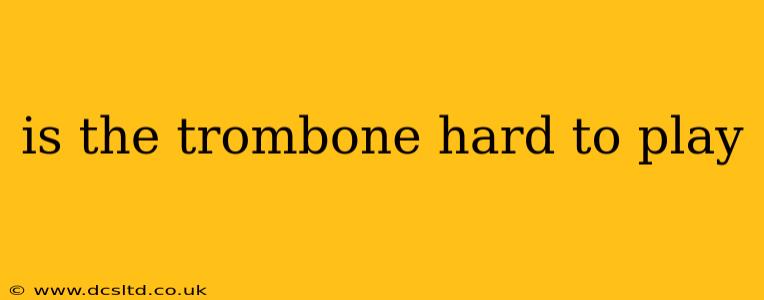The trombone, with its rich, expressive tone and impressive range, holds a captivating allure for many aspiring musicians. But the question on everyone's mind, especially beginners, is: is the trombone hard to play? The short answer is: it depends. Like any instrument, the difficulty of playing the trombone is relative and depends on several factors, including your musical background, practice habits, and personal aptitude.
What Makes the Trombone Challenging?
Several aspects of trombone playing can present initial challenges:
-
Embouchure: Developing a consistent and comfortable embouchure (mouth position) is crucial for producing a clear, resonant tone. This takes time, patience, and dedicated practice. Finding the right embouchure can feel awkward initially and may lead to fatigue in the early stages.
-
Slide Technique: The trombone's slide requires precise and controlled movements to accurately hit the desired notes. Developing good slide technique takes significant practice and coordination between hand and ear. Poor slide technique can result in intonation problems and an overall lack of musicality.
-
Intonation: Achieving accurate intonation—playing notes at the correct pitch—can be challenging, particularly in the higher register. The trombone's slide mechanism requires a precise and responsive touch to maintain consistent intonation across the instrument's range.
-
Breath Control: Like all brass instruments, good breath control is essential for producing a strong, consistent tone and playing long musical phrases. Developing sufficient lung capacity and breath support takes time and dedicated breathing exercises.
How Hard is it Compared to Other Instruments?
The perceived difficulty of the trombone often gets compared to other brass instruments, particularly the trumpet and tuba.
-
Compared to Trumpet: The trumpet generally has a steeper initial learning curve due to its smaller mouthpiece and demanding embouchure. However, the slide technique of the trombone presents a unique challenge not found on the trumpet. Some players find the trombone's slide easier to control once mastered, while others find the trumpet's more direct note production simpler.
-
Compared to Tuba: The tuba generally requires more lung capacity and a different embouchure. While the slide isn't involved, the tuba's larger size and lower register present their own challenges. The trombone sits in a middle ground in terms of physical demands compared to the trumpet and tuba.
What Factors Affect Difficulty?
Several factors influence how challenging the trombone is for a given individual:
-
Prior Musical Experience: Musicians with prior experience playing other instruments, especially wind instruments, often find the transition to the trombone smoother. Understanding basic music theory and having developed good breathing techniques provides a considerable advantage.
-
Practice Consistency: Consistent, focused practice is paramount. Regular practice, even in short bursts, is far more effective than infrequent, lengthy sessions.
-
Teacher/Instructor: A good teacher can make a huge difference. Experienced instructors can provide personalized guidance on embouchure, slide technique, and other crucial aspects, accelerating the learning process.
-
Natural Aptitude: Like any skill, some individuals naturally gravitate towards playing certain instruments more easily than others. While practice is key, inherent musicality and coordination can accelerate progress.
Can I Learn to Play the Trombone Easily?
While mastering the trombone takes time and effort, it's certainly achievable with dedicated practice and the right approach. Starting with a good teacher, focusing on fundamentals, and gradually building skills is essential. Don't be discouraged by initial challenges; celebrate small victories and maintain a positive attitude.
How Long Does it Take to Learn the Trombone?
There's no single answer to how long it takes to learn the trombone. It depends on the factors outlined above. Some may grasp the basics within a few months, while others may take longer. However, continued progress and refinement of technique is a lifelong journey for most trombonists.
Is the Trombone Worth Learning?
Absolutely! Despite the challenges, the trombone offers a rewarding musical experience. Its rich tone, expressive capabilities, and versatility make it a worthwhile instrument to learn, regardless of the time investment required. The satisfaction of producing beautiful music and the joy of musical expression far outweigh the initial difficulties.
